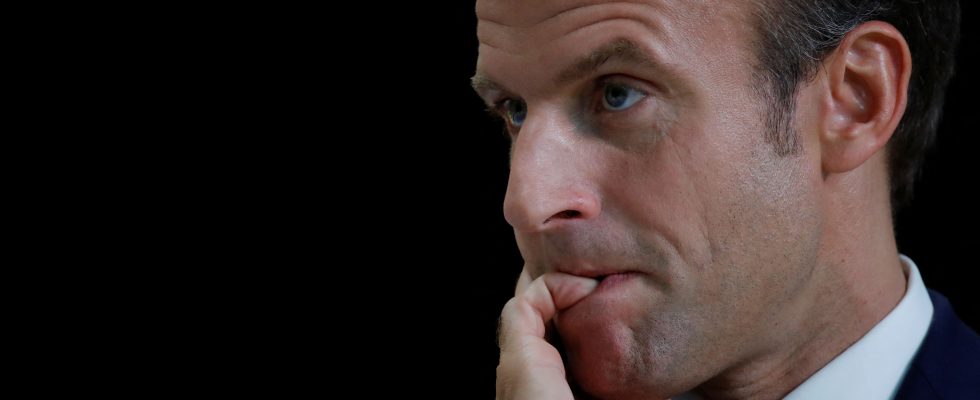A little lightning. A little mustachioed guy with a straw hat. A little red car. A small bar chart. Emoticons, one after the other, on a white sheet. This is how the presidential party summarized Emmanuel Macron’s intervention on Monday September 25 and irrigated social networks: with a list – “bullet points”, one would say in good English – of pearly measures. Point. If the children’s infographic is clear and the information intelligible, the image is just as telling: Emmanuel Macron’s major ecological plan, announced with great fanfare at the Elysée alongside Élisabeth Borne and ten seven members of the government, is in no way a transformation of its political software. Nor the dawn of a revolutionary page. “French ecology” is a brand; Macronist ecology is not a new story. Emmanuel Macron wanted it that way.
As the Head of State himself explained in the Ambassadors’ Lounge, this ecological plan is “the fruit of 14 months of work and consultation within the framework of the National Renovation Council”. It also comes in the wake of candidate Macron’s speech in Marseille, delivered between the two rounds of the presidential election to capture some of the Melenchonist votes, in which he made the ecological transition a central axis of his future. five-year term: “The policy that I will pursue will be ecological or it will not be”, he proclaimed, overlooking the Old Port. By all accounts among many of his supporters, it was one of the few exciting moments of his campaign; that is to say if this September 25 was expected. “It was not the speech of someone who speaks ecology as a living second language,” said a minister close to Emmanuel Macron a few weeks ago. People want to know if it came from the gut or not. So, on to the speech of Marseille, we must remove all doubts concerning our sincerity, that is the fundamental issue.”
Since the election of Emmanuel Macron, a fortiori since the end of the tumultuous retirement episode, there were a handful around the Head of State, notably among his former Elysee advisors, to advocate the establishment of a major ecological project. A total project, with multiple dimensions, allowing Macronie to write a new story for a “desirable, ambitious and optimistic” future, as described by MP David Amiel, architect of “progressism” with La République en Marche. No more management. Exit, the jolts and small steps. “This question is central, we cannot only approach it with a pragmatic vision while sparing no harm, otherwise no one will be satisfied with it and we will be given zero credit on the subject”, estimated before the summer one of the leaders of the Renaissance group.
“A catalog of common sense measures”
The President of the Republic had to define the contours and the heart of Macronist ecology. The latter now has a name: “French ecology”. Behind this effective concept, this brand image one dares, found by a power which loves the “branding” of political ideas – the Havas and Publicis culture has been there… -, Emmanuel Macron has declined measures. Expensive, yes. Ambitious, certainly. Who can blame him for wanting to halve CO2 emissions from industrial sectors by 2030? Or to promote public transport with the construction of 13 metropolitan RERs?
But what about this famous “story”? On Monday, the President of the Republic gave much more of a methodological speech, highlighting a toolbox (dear to François Hollande) with several drawers, than a powerful imagination capable of writing a new page and get the French to join. “We are more in a catalog of common sense measures than in a change of model, a change of society, it’s true. Otherwise, his 8 p.m., he would have done it Monday and not Sunday…”, recognizes this Tuesday a spawn of the Renaissance group. Did the Head of State, who assumes he does not want to create “ruptures”, only have the ambition to change the paradigm? Nothing is less sure.
The “common sense” that the President of the Republic absolutely wishes to attach to his ecological transition project is also found in his political strategy. “The test of facts”, some will say; “reality principle”, others will proclaim. So much the worse for one of the great self-claimed pillars of the Macronian corpus: the environmental vision will not have the same destiny as that of Europe, a subject on which Emmanuel Macron has managed to install a leg, a backbone, a horizon. In short, a story. And this, for good reason: the National Rally is lying in wait. The stigma of 2018 will still be felt in 2023, the yellow vests will have got the better of President Macron’s transformative desire. He knows the divisive subject, aware that radicalism in matters of ecology is, for the moment at least, bringing anxiety more than exaltation in a good number of layers of society. So he adapts, links his plan to all the themes carried by the RN: purchasing power, rurality, industry, sovereignty. He incites without constraining, advances without rushing, reforms more than he transforms, chooses a world a little better than a new world. This is more prudent, especially at the moment. And too bad for the story.
